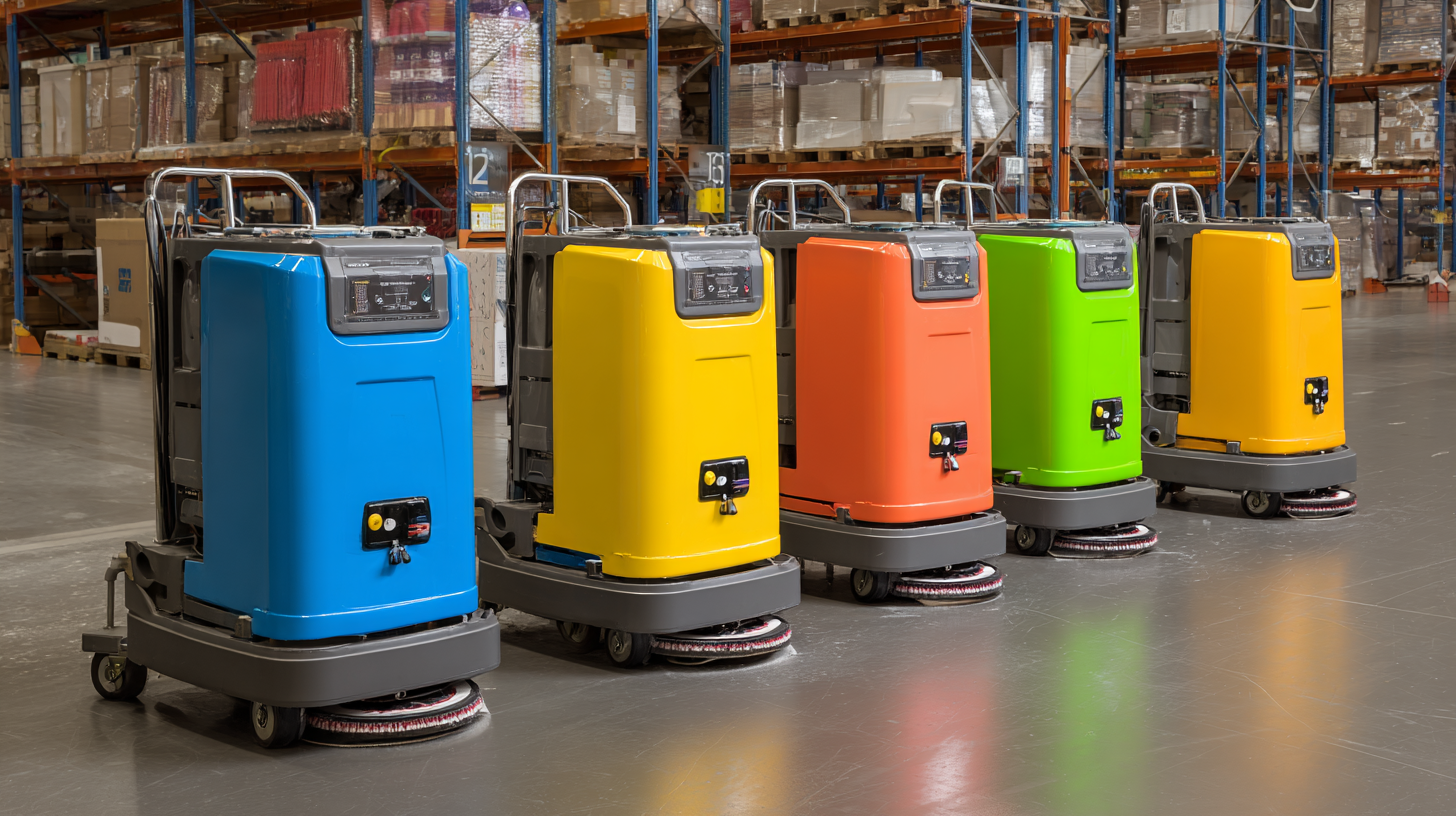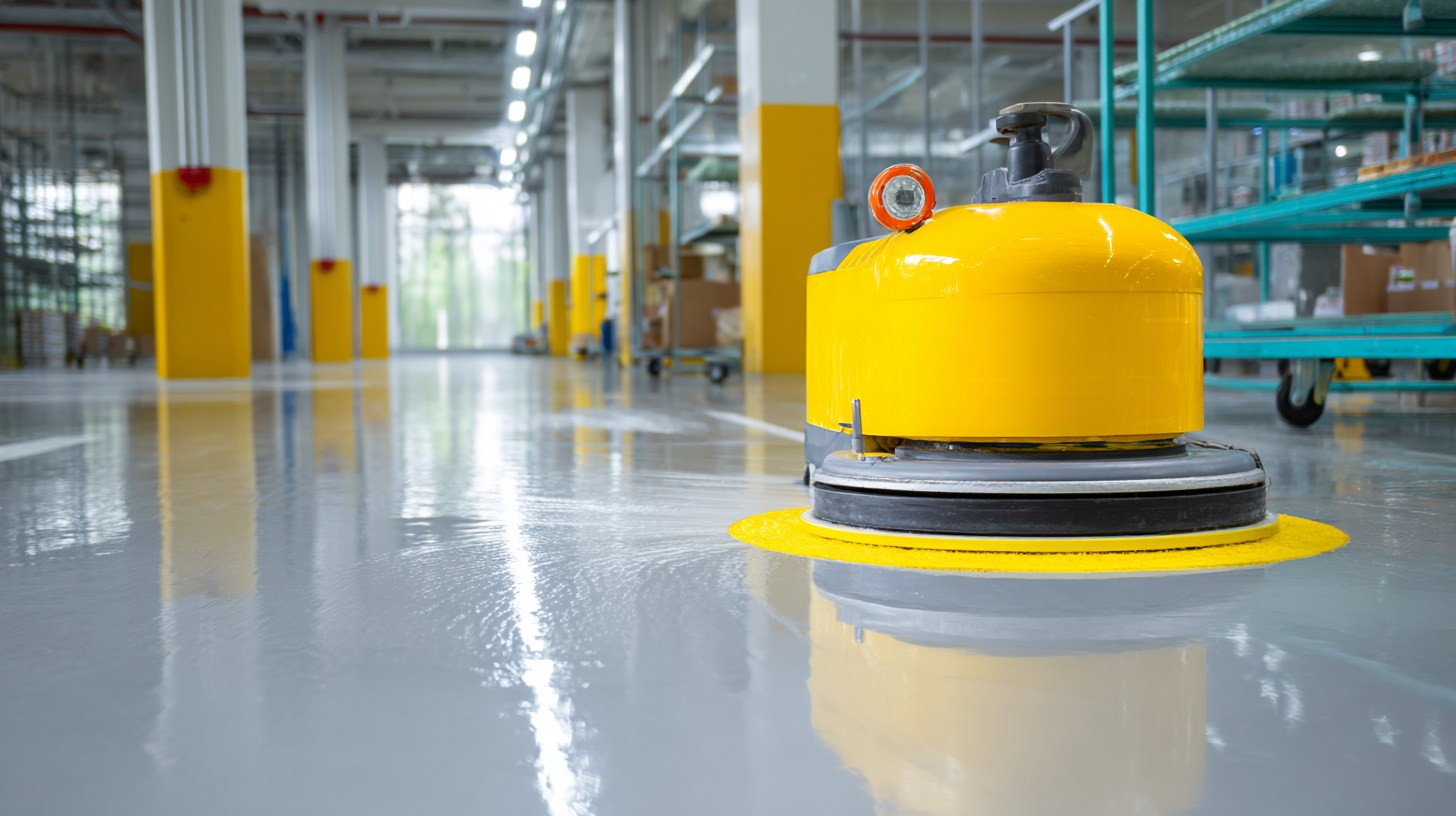Understanding the Challenges of Choosing the Best Industrial Floor Cleaner
In the realm of industrial manufacturing, the importance of maintaining clean and safe working environments cannot be overstated. According to a recent report by Research and Markets, the global industrial floor cleaner market is expected to reach approximately $11.5 billion by 2026, growing at a CAGR of 4.5% from 2021. This surge in demand is driven by the rising awareness of workplace health and safety regulations, coupled with the growing need for sanitation in various sectors including manufacturing, food processing, and healthcare. As companies increasingly recognize the critical role of a reliable industrial floor cleaner in preventing slips, falls, and contamination, the task of selecting the most effective cleaning solution poses significant challenges. Manufacturers must navigate a complex landscape of products tailored to diverse surfaces and specific cleaning needs, ensuring that they choose a solution that not only meets regulatory standards but also enhances operational efficiency.

Benefits of Selecting the Right Industrial Floor Cleaner for Your Business
Choosing the right industrial floor cleaner is crucial for maintaining a safe and productive work environment. Selecting an appropriate cleaner not only enhances the cleanliness of a facility but also promotes employee safety. A suitable industrial floor cleaner effectively removes dirt, grime, and hazardous materials, reducing the risk of slips and falls. This is especially important in settings such as warehouses, manufacturing plants, and retail spaces where heavy foot traffic can accumulate contaminants, potentially leading to accidents or injuries.
Additionally, the right industrial floor cleaner contributes to the longevity of flooring materials. Frequent use of incompatible cleaning solutions can damage surfaces, leading to costly repairs and replacements. By investing in the proper cleaning products tailored to specific floor types, businesses can protect their investment and ensure a visually appealing workspace. Furthermore, effective cleaning solutions often contain environmentally friendly ingredients, aligning with sustainable practices while complying with health and safety regulations. Ultimately, selecting the best industrial floor cleaner not only ensures cleanliness but also fosters a healthier work environment, enhances employee morale, and supports overall operational efficiency.

Key Factors to Consider When Evaluating Industrial Floor Cleaner Types
When evaluating industrial floor cleaners, it's essential to consider key factors that can significantly influence the effectiveness and efficiency of your cleaning operations. One critical component is the type of surface being cleaned, as different materials—such as concrete, tiles, or wood—require specific cleaning solutions and methods. According to a report from the ISSA (International Sanitary Supply Association), misalignment between floor type and cleaner can result in up to 30% lower cleaning performance, underscoring the necessity for targeted product selection.
Another important aspect is the environmental impact of cleaning agents. As sustainability becomes a dominant trend in the industry, many organizations are seeking eco-friendly options. Research from the EPA (Environmental Protection Agency) indicates that using green cleaning products can reduce hazardous chemical exposure for workers by 85%, enhancing workplace safety. Additionally, a well-considered cleaning strategy must factor in the required frequency and type of cleaning—daily maintenance versus deep cleaning—so that the chosen system can accommodate operational needs without disrupting workflow.
Comparing Eco-Friendly Industrial Floor Cleaners: Pros and Cons
When selecting an industrial floor cleaner, choosing an eco-friendly option can make a significant difference for both your facility and the environment. These cleaners often utilize plant-based ingredients and biodegradable components, reducing harmful chemical exposure for workers and customers alike. However, a common challenge is finding a product that remains effective against tough stains and grime. Some eco-friendly cleaners may not match the potency of traditional cleaners, leading to a more labor-intensive cleaning process.
Tips for selecting the right eco-friendly cleaner include checking for certifications or labels that verify its environmental claims. Look for products with third-party endorsements, which can provide additional assurance of their performance and safety. Additionally, consider the cleaner’s compatibility with your flooring type; not all eco-friendly options are suitable for every surface.
While eco-friendly industrial floor cleaners present many advantages, they also come with some cons. They may be more expensive than traditional cleaners and might require more time to achieve desired results. Despite these drawbacks, their long-term benefits—such as promoting a healthier workplace and reducing your carbon footprint—make them a worthwhile investment for many businesses. Choosing the right product involves weighing these pros and cons carefully.
Comparative Analysis of Eco-Friendly Industrial Floor Cleaners
How Choosing the Right Cleaner Impacts Workplace Safety and Health
Choosing the right industrial floor cleaner is crucial for maintaining a safe and healthy workplace. The type of cleaner used can greatly affect not only the cleanliness of the environment but also the well-being of the employees. Inadequate cleaning solutions can leave harmful residues that could pose slip hazards or lead to respiratory issues due to the chemicals involved. Thus, it’s essential to understand the cleaning product's components and their potential impact on health.
When selecting an industrial floor cleaner, consider eco-friendly options that are effective yet safe. These cleaners often have lower toxicity levels and are less likely to cause allergic reactions among workers. Additionally, ensure that the cleaner is suitable for the floor material to prevent damage that could lead to increased hazards over time.
Tip: Always conduct a risk assessment to identify the specific cleaning needs of your facility. Training staff on proper cleaning techniques and the safe use of cleaning chemicals can also significantly enhance workplace safety. Regularly review and update cleaning protocols to adapt to any changes in the workplace environment.
Understanding the Challenges of Choosing the Best Industrial Floor Cleaner - How Choosing the Right Cleaner Impacts Workplace Safety and Health
| Dimension | Detail |
|---|---|
| Type of Cleaner | Degreaser, Disinfectant, pH-neutral cleaner |
| Application Surface | Concrete, Vinyl, Tile, Wood |
| Health Risks | Irritation, Respiratory issues, Allergens |
| Environmental Impact | Biodegradable, Non-toxic options |
| Effectiveness | Speed of cleaning, Stain removal efficiency |
| Cost Consideration | Initial cost vs. long-term savings |
| Frequency of Use | Daily, Weekly, Monthly cleaning schedules |
Long-Term Cost Savings Associated with Optimal Floor Cleaning Solutions
When it comes to maintaining an industrial environment, the choice of floor cleaning solutions is crucial not only for cleanliness but also for long-term operational efficiency. Businesses often overlook the hidden costs associated with inadequate cleaning methods, which can lead to a myriad of issues such as damaged surfaces, increased maintenance efforts, and even potential safety hazards. Investing in the right industrial floor cleaner not only ensures superior cleanliness but also enhances the longevity of flooring materials, ultimately translating into significant cost savings over time.

Optimal floor cleaning solutions often feature advanced technologies designed to tackle heavy-duty dirt and grime with minimal resource consumption. By using high-efficiency equipment and eco-friendly cleaning solutions, companies can reduce water usage and energy costs, contributing to a more sustainable business model. Furthermore, effective maintenance can prevent the frequent need for costly repairs or replacements, allowing for better budget management and resource allocation. Therefore, while the initial investment in quality floor cleaning equipment may seem daunting, the long-term benefits far outweigh the costs, establishing a solid foundation for operational success.

